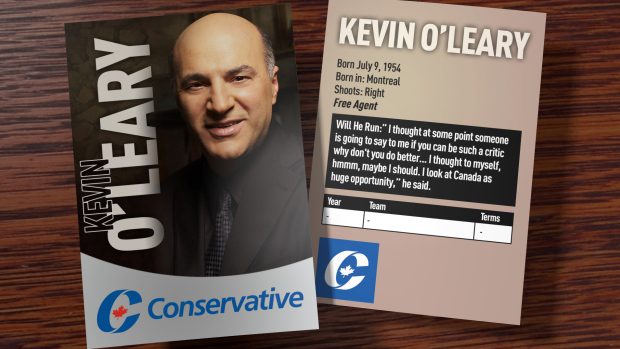As the field of Conservative leadership candidates continues to grow, one has to ask themselves just what that many candidates are bringing to the race? The awareness that this many candidates are all fishing in the same small membership pond seems to be slow to sink in, and so far, only one would-be candidate, Tony Clement, has seen fit to withdraw his candidacy for lack of an ability to fundraise. But how soon until the field starts winnowing down to some credible candidates that bring something to the table?
The dynamic at play in this leadership contest, that doesn't exist nearly to the same extent with the NDP and to an extent the Liberals, is that the modern Conservative party is much more of a coalition between the Red Tories and the more populist Reform Party elements, and for as much as everyone protests that oh no, these divisions are all dead and buried, they do still creep up, particularly at every party convention when proposals to change the way that leaders are selected. The Reform Party elements keep insisting on a full one-member-one-vote system, whereas the old Red Tories have managed to hold onto a system that weights membership votes on a points system that allows the smaller ridings in Atlantic Canada to avoid being swamped by the much larger western membership base.
If you look at the slate of candidates, there are only so many that are bringing something to the leadership table of substance, and even then, it's a gamble that some of those will pay off. While the common theory is that people use leadership bids to try and build some profile in the party and hope to gain some status out of it, I'm not sure that really holds true, particularly if you look at some of the also-rans with both the previous Liberal and NDP leadership races. In fact, some of those candidates failed to even win nomination races before the last election, which makes everyone wonder why they're even bothering. (This is especially true for those looking to enter the race that aren't even MPs at this point). And if it's policy they want to bring forward, let me remind you once again that leaders are not supposed to be developing policy top-down, but that it should be coming bottom-up from the grassroots, which makes these leadership platforms all the more maddening.
So let's ask ourselves about some of these candidates. Is there enough of a Libertarian base to the party that will give Maxime Bernier a fighting chance? He's come out with a raft of policy proposals that run counter to pretty much everything that the Conservative government did for the past decade, be it doing away with boutique tax credits and supply management, or looking to do away with provincial transfer payments in lieu of transferring tax points to those provinces. With a party that has become wedded to populism, can this very ideological proposal gain traction? And likewise with Brad Trost, are there really that many social conservatives concerned with abortion and same-sex marriage that he can not only win the leadership but not alienate the party's Red Tories in the process? I'm not sure the math is there.
Kellie Leitch has been taking the angry populist approach, content to attack her own caucus members to make her points about "Canadian values," many of which are completely opposed to some of the things that Brad Trost is so concerned about. Opposite that is Michael Chong, who has principled parliamentarianism going for him, and with some genuinely conservative ideas about using market mechanisms like carbon pricing (but not the way the Liberals have proposed, to be clear) and an eye on immigration and parliamentary institutions in what has been a fairly low-key campaign. But while Leitch has been attracting headlines, Chong has largely been under the radar, working the ground, but can he too gain enough support without being a radical in the race?
And the lack of radical ideas are certainly no barrier, but is a campaign based on tone enough to win and keep the party unified? Andrew Scheer seems to be the candidate of the establishment and party unity (hence why Leitch has been keen to attack him in particular), while Deepak Obhrai is casting himself as the "voice of experience," but has almost no current caucus support, unlike Scheer. Erin O'Toole has also attracted caucus support, and he is certainly projecting competence and being a nice guy, but his political career has been marked with a certain amount of a saviour complex since he was first elected in a by-election, and we'll see if that gets translated into his leadership campaign.
But what does anyone else bring to the already crowded table? Lisa Raitt is well-liked and has East Coast roots, but she's not an ideological conservative, and one imagines that she would rely on tone and a less angry populism, but is that enough to separate herself from the pack? But aside from her, one has to ask about the others still mulling. What does Steven Blaney bring other than his Stephen Harper fangirling? Chris Alexander other than ego? Andrew Saxton than a record of being a mediocre parliamentary secretary? Pierre Lemieux? Dan Lindsay? Adrienne Snow? How many of them actually think they can get an actual campaign off the ground?
At this point, with the front bench of the caucus exhausted, the only candidate who could actually bring something new and different to the race would be Kevin O'Leary, at the risk of creating a Donald Trump-lite scenario (though I don't imagine that O'Leary would wind up being anywhere near as destructive as Trump has proven to be), but even then, can he bring anything more to the table than the kind of personality that the race has been lacking? But with such a lacklustre field, that spark may be what people start demanding if the candidates aren't careful.






